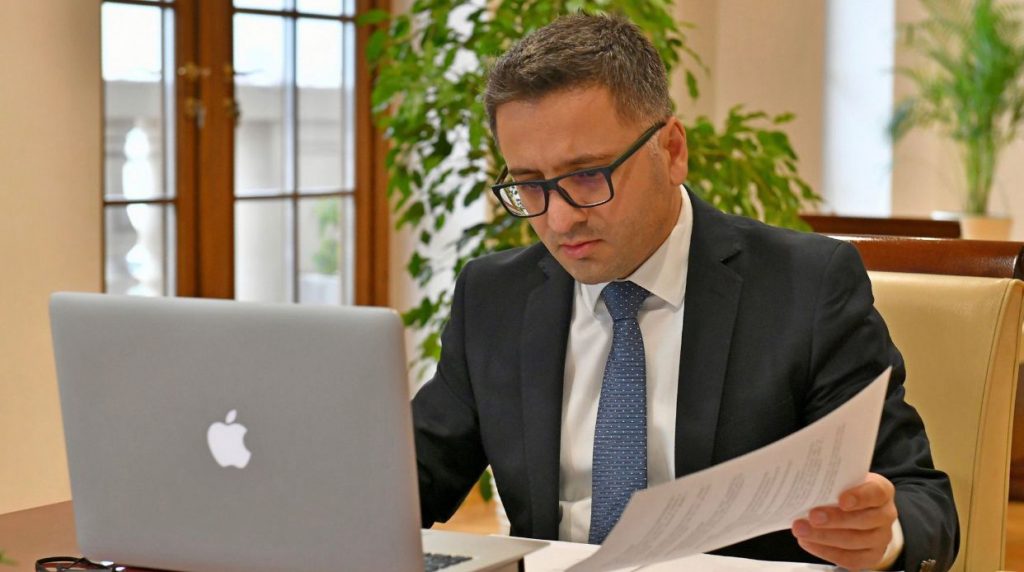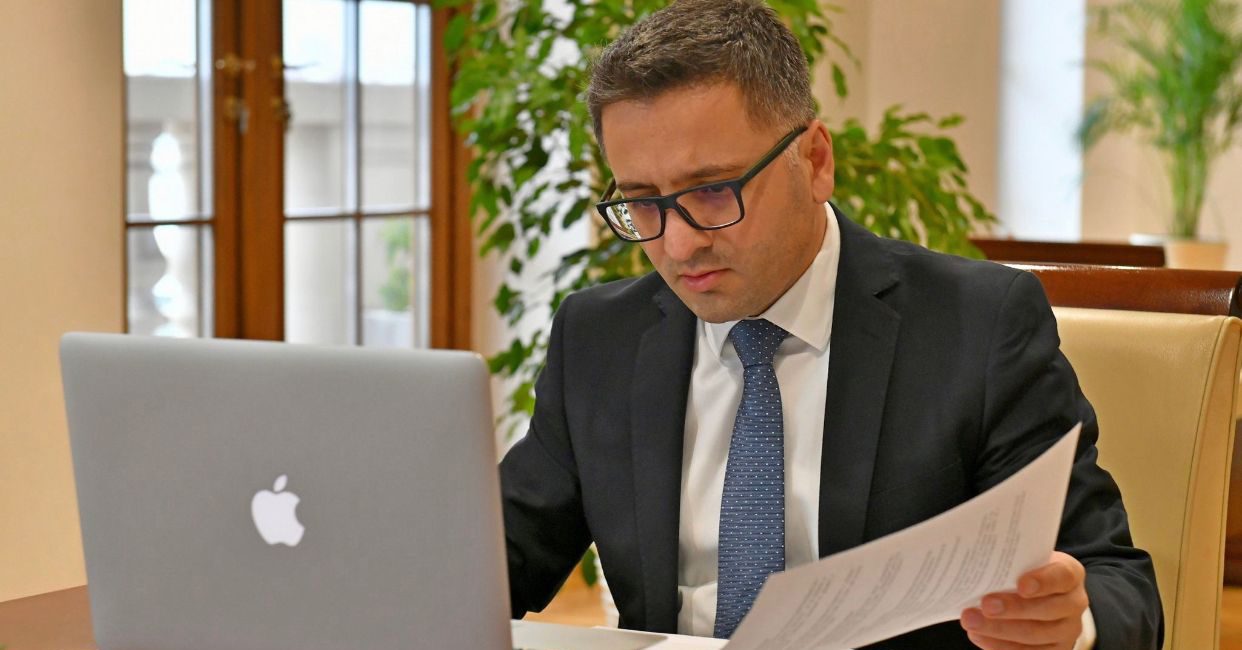25th September 2021, Skopje – During the past period, Ministry of Finance actively worked on reform aimed at strengthening the fiscal decentralization, which offers critical systemic solution for stable finances of the municipalities, implying accountable municipalities and delivery of quality and efficient services to the citizens. The reform, comprising three pillars: (1) enhanced fiscal capacity of the municipalities and increased municipal revenues; (2) strengthened fiscal discipline of the municipalities, arrears repayment and cost-effective operations and (3) increased transparency and accountability, has been translated into law which has already undergone government procedure. Activities envisaged under the draft Law on Financing Local Government Units are aimed at ensuring further democratization of the society, more efficient and cost-effective provision and rendering of services, as well as intensified local development.

Building a well-established public finance system is an extensive process, comprising many segments, among which the fiscal decentralization, at the same time being a basis for sustainable economic system. Strengthening the fiscal decentralization is fully in line with the Council of Europe’s European Charter on Local Self-Government (1985), which was adopted with a Declaration and ratified by our Parliament in 1997.
Local authorities are the closest to the citizens, hence, transferring more competences to the local level and allocating more funds will contribute to functioning municipalities and better rendering of services. They take up many important areas directly affecting the life of the citizens. Their competence includes education, social care, environment protection, utility services, sports and recreation, firefighting, ….., therefore it is crucial for they to be allocated stable finances.
More resources and new Funds for distribution of revenue funds to the municipalities
Data show that funds allocated to the municipalities increased from Denar 5.9 billion to Denar 37 billion in the period 2009-2019. Pursuant to law, the municipalities are now allocated Denar 2.8 billion on the basis of VAT grants and PIT. Under the reform, the funds allocated are envisaged to increase to Denar 5.2 billion in 2024. Percentage of revenues transferred to the municipalities on the basis of PIT will be increased from the existing 3% to 6%, with percentage of VAT grants also increasing from 4.5% to 6%, starting 2024. It is envisaged for percentage of PIT revenues transferred to increase gradually by 2024, i.e. 4% in 2022, 5% in 2023, reaching 6% in 2024. Municipalities are allocated the revenues on the basis of PIT collected on the wages of individuals with permanent or temporary place of residence in the respective municipality. Moreover, percentage of VAT grants transferred will gradually increase, to 5% in 2022 and 5.5% in 2023.
Funds on the basis of the additional increase of VAT percentage for the municipalities will be distributed in two new funds – Performance Fund and Equalization Fund.
Municipalities showing higher own revenue collection will be awarded funds from the Performance Fund, while the Equalization Fund will be aimed towards offsetting the differences considering the fiscal capacity of the municipalities. In fact, municipalities showing positive results and higher own revenue performance will be awarded more funds from the Performance Fund, while municipalities with lower revenue performance due to the limited resource capacity, but showing fiscal effort and good results in collecting their own revenues, will be awarded funds from the Equalization Fund. Thereby, the “per capita” criterion in the General Fund for Distribution of VAT Funds will be raised from 65% to 80%, taking into account the fact that the citizens contribute to VAT revenues through consumption, as well as that the number of citizens is a relevant indicator to determine the need for public services the municipalities are to render to their citizens.
Starting 2024, 0.75% of VAT collected in the previous fiscal years will be distributed to the Performance Fund and the Equalization Fund each respectively, with 4.5% allocated to the General Fund.
In 2022, once the funds envisaged to be allocated to the municipalities start to gradually increase, 0.25% will be distributed to the Performance Fund and the Equalization Fund each respectively, with 4.5% allocated to the General Fund. In 2023, with the percentage of VAT revenues increasing to 5.5% of the VAT collected in the previous fiscal year, the Performance Fund and the Equalization Fund will be distributed 0.5% each respectively, with 4.5% allocated to the General Fund.
In addition to boosting the fiscal capacity and increasing the municipal revenues, the reform is geared towards improving the efficiency of the administration and finding new local revenues according to EU best practices for quality of services and strengthening the criteria for distribution of the funds allocated for the transferred competences.
Special program and new instruments aimed at strengthened financial discipline
The second pillar is aimed at strengthening the financial discipline of the municipalities, arrears repayment and cost-effective operations, while the activities are steered towards planning the actual revenues and expenditures of the municipalities, rationalizing the operations and reducing the unnecessary expenditures, regular servicing of arrears, strengthened financial discipline, procedures on declaring financial instability, issuance of municipal bond and analyzing the existing arrears of both the municipalities and the public enterprises.
In the period of financial instability, which will be declared by force of law from now on, the municipalities will be provided support on the basis of a special program. To overcome the arrears issues, the municipalities will have available up to 10-year structural bond to reschedule the arrears. This bond is one of the three envisaged instruments. Under the respective Law, they can use a Stand-By Credit from the Ministry of Finance and can issue a municipal bond with the Ministry of Finance as purchaser. The relevant amendment will come into force starting July 2022, so as to allow the municipalities sufficient time to adjust. Furthermore, during the transition period from the day the amendments to the Law are adopted, the municipalities will have a possibility to use a structural bond for the existing arrears as of 30th September 2021 inclusive. The goal of this transitional solution is to give the municipalities a possibility to consolidate their budgets and to focus on their development.
Resolving the issues of arrears is related to the fulfilment of the requirements for declaring financial instability, which, on the other hand, envisages strengthening of the whole procedure from the very moment of declaring financial instability to the moment it is overcome. This implies that the municipalities cannot use the funds for non-essential costs. In other words, the municipalities will be allocated more funds, coupled with strengthened oversight over their finance operations.
Strengthened spending accountability
By strengthening fiscal accountability of the municipalities, transparency in their operations will be also enhanced.
They will be obliged to publish the financial data in a transparent manner on their websites, implying strengthened spending accountability for all funds allocated by the government. Oversight will be enhanced, in particular by the Department for Public Sector Financial Inspection in terms of reporting non-compliance with the Law on Reporting and Recording Liabilities and reporting non-compliance with the Law on Financial Discipline.
Faster regional development and more funds for infrastructure projects through the Regional and Local Development Agency
Faster regional development will be achieved by allocating more funds for infrastructure projects, which will be available through the newly established Regional and Local Development Agency.
The Agency will be allocated funds from the central Budget, as well as from national and international financial institutions, to finance the capital infrastructure projects of the municipalities.
In addition, municipal development is to a great extent supported through central government projects financed by international financial institutions. Cross-border cooperation, funded by the EU and co-funded by the government Budget, is also of considerable importance.
By engaging the central and the local government, as well as by allocating more funds to development projects, change and improvement of the living conditions in all municipalities will come sooner rather than later.
Much research shows a positive correlation between the level of fiscal decentralization and the level of economic development, i.e. average level of fiscal decentralization in the advanced economies is higher compared to the one in the developing countries.
Through inclusive and transparent process to optimal solutions
Overall process in the period so far was carried out through public consultations with the Association of Local Government Units (ALGU), the international development partners, the academicians, the business community and other stakeholders, all to the end of reaching optimal solutions through an inclusive and transparent process, which will provide for the municipalities to be functional and deliver quality services to the citizens.
Several years following the ratification of the European Charter on Local Self-Government, in particular following the adoption of the Law on Local Government in 2002, Republic of North Macedonia took up the process of transferring part of the competences related to collection of public revenues and execution of public expenditures of LGUs. Decentralization process was implemented in several stages. The municipalities provided the minimum necessary capacities for financial management in “stage zero”. The first stage included taking over the property and assuming the liabilities from the decentralized competences, while as regards the second stage, the municipalities took over the decision-making competences pertaining to the functioning of the budget users.
Fiscal decentralization was also carried out in several stages, while a serious step forward was made in July 2005, with the amendments and modifications to the Law on Property Tax, the Law on Utility Fees and the Law on Administrative Fees.
Fiscal decentralization is a process which needs to be upgraded and reformed, above all jointly and by efforts the municipalities themselves make to collect own revenues, which, together with the central government, can render better services to their citizens.
At the very end, considering that through this set of reforms we create more opportunities for financing and development of the municipalities by strengthening the local government and the financial autonomy, all to the end of yielding successful outcome, using Paul Harvey’s rhetoric, I will conclude with one of his saying, as a message to future mayors: “Self-government won’t work without self-discipline.”
Fatmir Besimi, Minister of Finance
















